
Rush was a Canadian rock band that primarily comprised Geddy Lee, Alex Lifeson (guitar) and Neil Peart. The band formed in Toronto in 1968 with Lifeson, drummer John Rutsey, and bassist and vocalist Jeff Jones, whom Lee immediately replaced. After Lee joined, the band went through several line-up changes before arriving at its classic power trio line-up with the addition of Peart in July 1974, who replaced Rutsey four months after the release of their self-titled debut album; this line-up remained intact for the remainder of the band's career.
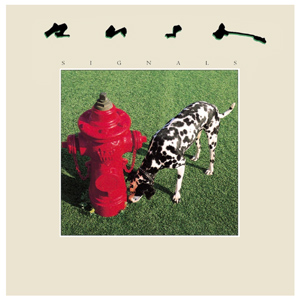
Signals is the ninth studio album by Canadian rock band Rush, released on September 9, 1982 by Anthem Records. After the release of their previous album, Moving Pictures, the band started to prepare material for a follow-up during soundchecks on their 1981 concert tour and during the mixing of their subsequent live album Exit...Stage Left. Signals demonstrates the group's continuing use of synthesizers, sequencers, and other electronic instrumentation. It is the last album produced by their longtime associate Terry Brown, who had worked with them since 1974.
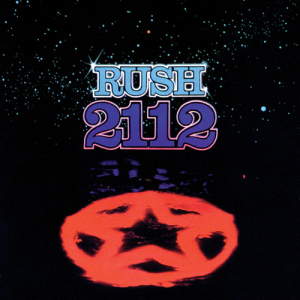
2112 is the fourth studio album by Canadian rock band Rush, released in March 1976 by Mercury Records. It reached No. 5 in Canada and became the band's commercial breakthrough in the US, peaking at No. 61.

Fly by Night is the second studio album by the Canadian rock band Rush, released on February 14, 1975, by Mercury Records. It was the first Rush album to showcase elements of progressive rock for which the band has become known. It was also the first to feature lyricist and drummer Neil Peart, who replaced original drummer John Rutsey the previous summer just prior to the band's first North American tour. Peart took over as Rush's primary lyricist, and the abundance of fantastical and philosophical themes in his compositions contrasted greatly with the simpler hard rock of the band's debut album.
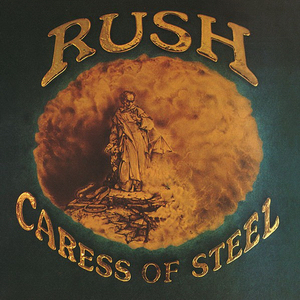
Caress of Steel is the third studio album by Canadian rock band Rush, released on September 24, 1975, by Mercury Records. It was recorded immediately after the band concluded touring in support of their previous album, Fly By Night, and marked a development in the group's sound, moving from the blues-based hard rock style of their debut towards progressive rock. Songs such as "The Necromancer" furthered Rush's advancement into narrative-driven, fantasy-based compositions, while "The Fountain of Lamneth" was their first prog-rock "epic" to span an entire side of vinyl. Other tracks like "Bastille Day" and "Lakeside Park" became staples of the band's live setlists.
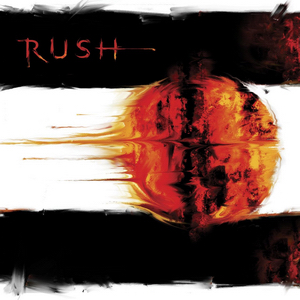
Vapor Trails is the seventeenth studio album by Canadian rock band Rush. It was released on May 14, 2002, on Anthem Records, and was their first studio release since Test for Echo (1996), the longest gap between two Rush albums. After the Test For Echo tour finished in July 1997, drummer and lyricist Neil Peart suffered the loss of his daughter and then his wife in separate tragedies. As a result, the group entered an extended hiatus during which it was not certain they would continue. They eventually reunited in January 2001 to rehearse material for a new album, recording for which lasted until December. For the first and only time since Caress of Steel (1975), the group did not use any keyboards or synthesizers in their music, incorporating many layers of guitar, bass and drums instead.
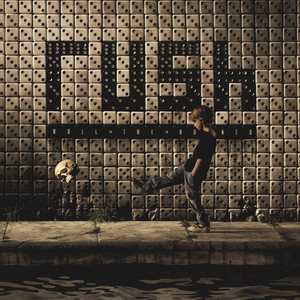
Roll the Bones is the fourteenth studio album by Canadian rock band Rush, released September 3, 1991, on Anthem Records. The band began working on the album after a brief creative hiatus following the tour promoting their previous release, Presto (1989).
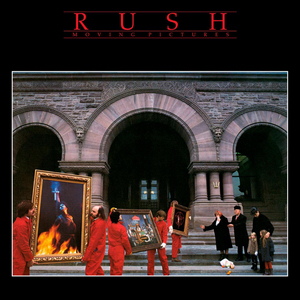
Moving Pictures is the eighth studio album by Canadian rock band Rush, released on February 12, 1981, by Anthem Records. After touring to support their previous album, Permanent Waves (1980), the band started to write and record new material in August 1980 with longtime co-producer Terry Brown. They continued to write songs with a more radio-friendly sound, featuring tighter and shorter song structures compared to their earlier albums.

Power Windows is the eleventh studio album by Canadian rock band Rush, released on October 11, 1985 in Canada by Anthem Records and on October 21, 1985 in the United States. After touring in support of their previous album, Grace Under Pressure (1984), the band took a break and reconvened in early 1985 to begin work on a follow-up. The material continued to display the band's exploration of synthesizer-oriented music, this time with the addition of sampling, electronic drums, a string section, and choir, with power being a running lyrical theme. Power Windows was recorded in Montserrat and England with Peter Collins as co-producer and Andy Richards on additional keyboards.

Rush in Rio is a three-disc live album by Canadian band Rush, released on October 21, 2003. The album is also available as a two DVD set. With the exception of the last two tracks on the third disc, the album was recorded at Maracanã Stadium in Rio de Janeiro on the final night of the Vapor Trails Tour. The other two tracks were taken from previous shows on the same tour. "Between Sun & Moon" was recorded at the Cricket Wireless Pavilion, Phoenix, Arizona, on September 27, 2002, and "Vital Signs" was recorded at the Colisée Pepsi, Quebec City, Quebec, on October 19, 2002.
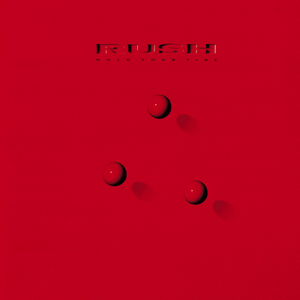
Hold Your Fire is the twelfth studio album by Canadian rock band Rush, released on September 8, 1987. It was recorded at The Manor Studio in Oxfordshire, Ridge Farm Studio in Surrey, Air Studios in Montserrat and McClear Place in Toronto. Hold Your Fire was the last Rush studio album released outside Canada by PolyGram/Mercury. 'Til Tuesday bassist and vocalist Aimee Mann contributed vocals to "Time Stand Still" and appeared in the Zbigniew Rybczyński-directed video.

Presto is the thirteenth studio album by Canadian rock band Rush. It was released on November 17, 1989 by Anthem Records and was the band's first album released internationally by Atlantic Records, following the group's departure from Mercury. After the Hold Your Fire (1987) tour ended in 1988, the group members reconvened in December to decide their next step and agreed to take six months off before starting on a new album. Presto marked another change in Rush's sound, with guitar taking a more dominant role in the writing, a reduction in synthesizers and a return towards more guitar-driven arrangements.

Counterparts is the fifteenth studio album by Canadian rock band Rush, released October 19, 1993, on Anthem Records. After the band finished touring its previous album Roll the Bones (1991) in mid-1992, the members took a break before starting work on a follow-up.
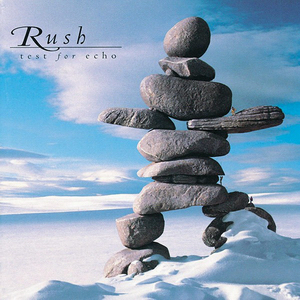
Test for Echo is the sixteenth studio album by the Canadian rock band Rush, released on September 10, 1996, by Anthem Records. It was the final Rush album to be co-produced by Peter Collins. The band supported the album with a world tour in 1996 and 1997, after which they went on a five-year hiatus following the deaths of drummer Neil Peart's daughter and wife, and would not record again until 2001.

"Tom Sawyer" is a song by Canadian rock band Rush, originally released on their 1981 album Moving Pictures as its opener. The band's lead singer, bassist, and keyboardist, Geddy Lee, has referred to the track as the band's "defining piece ... from the early '80s".
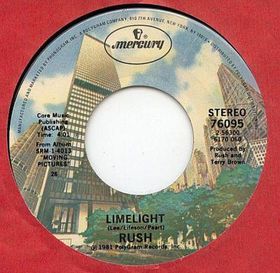
"Limelight" is a song by Canadian progressive rock band Rush. It first appeared on the 1981 album Moving Pictures. The song's lyrics were written by Neil Peart with music written by Geddy Lee and Alex Lifeson. "Limelight" expresses Peart's discomfort with Rush's success and the resulting attention from the public. The song paraphrases the opening lines of the "All the world's a stage" speech from William Shakespeare's play As You Like It. The band had previously used the phrase for its 1976 live album. The lyrics also refer to "the camera eye", the title of the song that follows on the Moving Pictures album.

Snakes & Arrows is the eighteenth studio album by Canadian rock band Rush, released on May 1, 2007, by Anthem Records. After their R30: 30th Anniversary Tour ended in October 2004 the band took a one-year break, during which they agreed to start work on a follow-up in January 2006. The album was recorded in five weeks with co-producer Nick Raskulinecz, a fan of the group who was praised by each member for his approach and technique. It contains three instrumental tracks, the most on any Rush album.
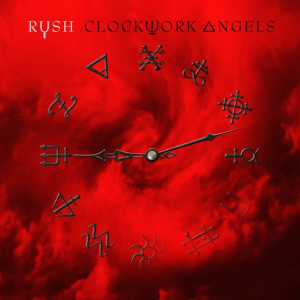
Clockwork Angels is the nineteenth and final studio album by Canadian rock band Rush, released on June 8, 2012, on Roadrunner Records. During the band's year-and-a-half break following its Snakes & Arrows Tour, the group decided to write a new studio album. Most of the album was recorded between October and December 2011 at Revolution Recording in Toronto, Ontario, Canada.

"Headlong Flight" is the second single from Canadian rock band Rush's 19th studio album, Clockwork Angels. It was released to radio stations and for online preview on April 19, 2012, and became available digitally and on disk April 24, 2012. A lyrics video was also made available on YouTube. In an interview with Rolling Stone, Geddy Lee commented on the song:
'Headlong Flight' was one of those songs that was a joy to write and record from beginning to end. Alex [Lifeson] and I had blast jamming in my home studio one day before the second leg of the Time Machine tour, and I did not revisit that jam until a year later. Alex and I assembled the song to be an instrumental and its original title was 'Take That Lampshade Off Yo Head!,' but once we saw the lyrics Neil [Peart] had written, I knew that the spirit of the lyrics matched the instrumental perfectly and it was just a matter of making them fit and writing the melodies.

"Lock and Key" is a song written, produced and performed by Canadian rock band Rush. It is a promotional single from their twelfth studio album, Hold Your Fire. The song deals with the theme of every human being’s primal, violent instincts underneath their civil appearance - their “killer instinct”. Critics gave the song liking reviews, with some saying it had quality of a hit single, and would make it on the Billboard Hot Mainstream Rock Tracks chart; it went on to reach number 16 on the chart. The song's music video was originally released in 1987, and was produced by Bob Jason and directed by T. Vanden Ende. The song was only played live by the band on the Hold Your Fire Tour.




















